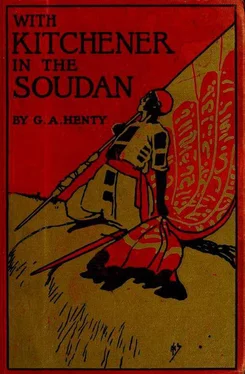Scarcely had the messenger arrived with the news, when the Dervishes came rushing on through the high grass. In spite of the shouts of Doctor Fleming and Gregory, the escort of one hundred and twenty irregular Arabs stationed at this point at once broke and fled. Happily a portion of the camel corps, with its commander, Captain Ruthven, a militia officer, was close at hand. Though he had but thirty-four of these old soldiers with him, he rushed forward to meet the enemy. Doctor Fleming and Gregory joined him, and, all cheering to encourage the Soudanese, made a determined stand. Gregory and Zaki kept up a steady fire with their Remingtons, and picked off several of the most determined of their assailants. The fight, however, was too unequal; the Dervishes got in behind them and cut off the rear portion of the transport, and the little band, fighting obstinately, fell back with their faces to the foe towards the main body.
One of the native officers of the Soudanese fell. Captain Ruthven, a very powerful man, ran back and lifted the wounded soldier and made his way towards his friends. So closely pressed Avas he by the Dervishes that three times he had to lay his burden down and defend himself with his revolver, while Gregory and Zaki aided his retreat by turning their fire upon his assailants. For this splendid act of bravery Captain Ruthven afterwards received the Victoria Cross. Flushed by their success, the Dervishes pushed on. Fortunately at this time the main force of the Dervishes was beginning to waver, unable to withstand the steady fire of the defenders of the hill, and as they drew back a little the Egyptian and Arab battalions rushed forward.
Shaken as they were, the Dervishes were unable to resist the attack, and broke and fled, pursued by the Arab battalion. The Egyptians, however, obeyed the orders of Captain MacKerrel and, halting, faced about to encounter the attack from the rear. Their volleys caused the Dervishes to hesitate, and Captain Ruthven and his party reached the summit of the hill in safety. The enemy, however, maintained a heavy fire for a few minutes, but the volleys of the Egyptians at a distance of only a hundred yards were so deadly that they soon took to flight. The first shot had been fired at half-past eight. At ten the whole Dervish force was scattered in headlong rout. Had Colonel Parsons possessed a cavalry force the enemy would have been completely cut up; as it was, pursuit was out of the question. The force therefore advanced in good order to Gedareh. Here a Dervish Emir, who had been left in charge when the rest of the garrison moved out, surrendered at once with the two hundred black riflemen under him. He had long been suspected of disloyalty by the Khalifa, and at once declared his hatred of Mahdism, declaring that though he had not dared to declare himself openly, he had always been friendly to Egyptian rule.
The men with him at once fraternized with the Arabs of Colonel Parsons' force, and were formally received into their ranks. The Emir showed his sincerity by giving them all the information in his power as to Fadil's position and movements, and by pointing out the most defensible positions. None of the British officers had been wounded, but fifty-one of the men had been killed and eighty wounded. Five hundred of the Dervishes were left dead upon the field, including four Emirs. Not a moment was lost in preparing for defence, for it was certain that Fadil, on hearing the news, would at once march to retake the town. The position was naturally a strong one. Standing on rising ground was Fadil's house, surrounded by a brick wall twelve feet high. Here the Egyptian battalion and camel corps were placed, with the hospital and two brass guns which had been found there. A hundred yards away was another enclosure with a five-foot wall, and two hundred yards away a smaller one. The Arab battalion was stationed to the rear of this in a square enclosure with a brick wall twelve feet high, in which was situated a well.
These four buildings were so placed that the fire from each covered the approaches to the other. Two hundred yards from the well enclosure was a fortified house surrounded by a high wall. As the latter would need too many men for its defence, the wall was pulled down and a detachment placed in the house. No time was lost. The whole force was at once employed in pulling down huts, clearing the ground of the high grass, and forming a zareba round the town. The greatest cause for anxiety was ammunition. A large proportion of that carried in the pouches had been expended during the battle, and the next morning Colonel Parsons, with a small force, hurried back to Mugatta to fetch up the reserve ammunition, which had been left there under a guard. He returned with it three days later. An abundant supply of provisions had been found in Gedareh, for here were the magazines not only of the four thousand men of the garrison and the women who had been left there, but sufficient for Fadil's army on their return. There were three or four wells and a good supply of water.
The ammunition arrived just in time, for on the following morning Captain Ruthven's camel-men brought in news that Fadil was close at hand. At half-past eight the Dervishes began the attack on three sides of the defences. Sheltered by the long grass they were able to make their Avay to within three hundred yards of the dwellings occupied by the troops. But the intervening ground had all been cleared, and though time after time thejr made rushes forward, they were unable to withstand the withering fire to which they were exposed.
After an hour's vain efforts their musketry fire ceased, but half an hour later strong reinforcements came up and the attack recommenced. This was accompanied with no greater success than the first attack, and Fadil retired to a palm-grove two miles away. Of the defenders five men were killed, and Captain Dwyer and thirteen men wounded.
For two days Fadil endeavoured to persuade his troops to make another attack, but although they surrounded the town and maintained a scattered fire they could not be brought to attempt another assault, having lost over five hundred men in the two attacks the first day. He then fell back eight miles.
Three days later Colonel Parsons said to Gregory: " I think the time has come, Mr. Hilliard, when I must apply for reinforcements. I am convinced that we can repel all attacks, but we are virtually prisoners here. Were we to endeavour to retreat, Fadil would probably annihilate us. Our men hava behaved admirably; but it is one thing to fight well when you are advancing, and another to be firm in retreat. But our most serious enemy at present is fever. Already the stink of the unburied bodies of the Dervishes is overpowering, and every day it will become worse. Dr. Fleming reports to me that he has a great many sick on his hands, and that he fears the conditions that surround us will bring about an epidemic; therefore I have decided to send to General Rundle for a reinforcement that will enable us to move out to attack Fadil."
"Very well, sir, I will start at once."
"I will write my dispatch, it will be ready for you to carry in an hour's time. You had better pick out a couple of good donkeys from those we captured here. As it is only nine o'clock you will be able to get to Mugatta this evening. I don't think there is any fear of your being interfered with by the Dervishes. We may be sure that Fadil is not allowing his men to roam over the country, for there can be little doubt that a good many of them would desert as soon as they got fairly beyond his camp."
"I don't think there is any fear of that, sir; and as my camels will have had ten days' rest, I should have very little fear of being overtaken even if they did sight us."
" We are off again, Zaki," Gregory said. " We will go down to the yard where the animals we captured are kept, and choose a couple of good donkeys. I am to carry a dispatch to Omdurman, and as time is precious we will make a straight line across the desert; it will save us fifty or sixty miles."
Читать дальше












